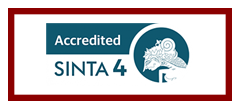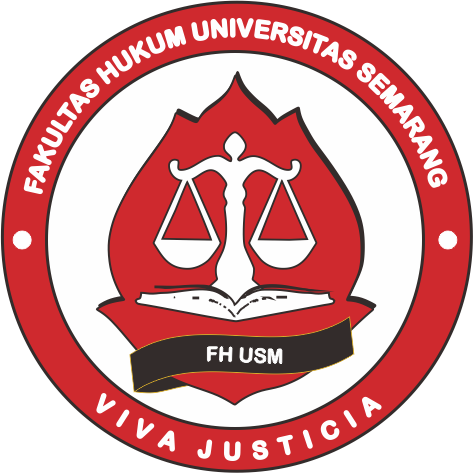PERBUATAN MELAWAN HUKUM DALAM PARADIGMA HUKUM PROGRESIF: REFLEKSI ATAS KESADARAN BERHUKUM
DOI:
https://doi.org/10.26623/slr.v6i1.11446Keywords:
Perbuatan Melawan Hukum, Hukum Progresif, Kesadaran BerhukumAbstract
The act against the law is part of legal relation sourced from the law as a result of human deeds against the law intentionally or unintentionally causing the relationship and the 1 consequence of the law for someone’s responsibility in the loss due to reinforcement of other person or animal or things under his authority or supervision. Therefore, the act against the law become important to be highlited especially after having the development of substantial meaning. The focus of this observation is on the useful message covered by wide intepretation and basic thought on it, does not include substantial material using the normative judicial method. The research showed that new paradigm causing the emerge of wide interpretation through the act against the law after 31 January 1919 for Lindenbaum-Cohen cases started from Hoge Raad (Dutch Supreme Court) response over justice seekers that their interests were overruled and caused the loss but can not be processed through law formulation at the time. Therefore, through the awareness and courages, Hoge Raad (Dutch Supreme Court) applied progressive thought as the breakthrough in answering the deadlock of positive law. The act of Hoge Raad reflected implementation of the awareness and deep understanding of carrying out the law correctly by returning law position as justice guarantee at once to declare that law for human not human for law. Unfortunately, in our nation’s context, the act of Hoge Raad does not contribute the inspiration for most of us in progressive law. There are a lot of us being trapped rigidly by legalism positivism that admitted act as the only law and absolute guidance. It is not justified outside it because it is not the law.
Abstrak
Perbuatan melawan hukum merupakan bagian dari perikatan yang bersumber dari undang-undang akibat perbuatan manusia yang melawan hukum, baik karena kesengajaan maupun karena kelalaian yang melahirkan hubungan serta akibat hukum bagi seseorang untuk mempertanggungjawabkan kerugian akibat perbuatannya atau perbuatan orang lain atau binatang ataupun barang/benda yang berada di bawah kekuasaan atau tanggungannya ataupun pengawasannya. Itu sebabnya perbuatan melawan hukum menjadi penting untuk disoroti, terutama setelah mengalami perkembangan makna substansinya. Objek kajian ini lebih terfokus pada pesan makna yang terkandung dalam penafsiran yang luas dan landasan pemikiran yang menyertainya, bukan pada substansi materi di dalamnya, dengan menggunakan metode yuridis normatif. Hasil penelitian menunjukkan bahwa paradigma baru yang mendasari lahirnya penafsiran luas terhadap perbuatan melawan hukum pasca 31 Januari 1919 dalam kasus Lindenbaum-Cohen adalah bermula dari respons Hoge Raad (Mahkamah Agung Belanda) atas kegelisahan para pencari keadilan yang kepentingannya dilanggar dan menimbulkan kerugian, tetapi senantiasa tidak bisa diproses melalui formulasi hukum yang berlaku saat itu. Oleh karena itu dengan kesadaran dan keberanian, Hoge Raad menggunakan cara berpikir progresif sebagai terobosan untuk menjawab kebuntuan hukum positif. Tindakan Hoge Raad itu mencerminkan implementasi suatu kesadaran dan pengertian yang mendalam tentang cara berhukum yang benar yakni dengan mengembalikan posisi hukum sebagai pemberi jaminan keadilan sekaligus mengikrarkan bahwa hukum untuk manusia dan bukan manusia untuk hukum. Sayangnya dalam konteks bangsa kita, tindakan Hoge Raad itu belum menjadi inspirasi menyeluruh bagi terbanyak kita dalam berhukum dengan pikiran progresif. Masih lebih banyak kita yang terbelenggu dengan kekakuan pikiran ajaran legisme/positivisme hukum yang hanya mengakui undang-undang sebagai satu satunya hukum dan pedoman absolut. Diluar itu tidak dibenarkan, sebab bukan hukum.
References
Achmad Gunawan B.S dan Mu’ammar Ramadan (Penyunting). (cet. 1. 2006). Menggagas Hukum Progresif Indonesia. Yogyakarta: Kerjasama Pustaka Pelajar IAIN Walisongo dan Program Doktor UNDIP.
Fajar, Mukti dan Yulianto Achmad, Dualisme Penelitian Hukum Normatif dan Empiris. Yogyakarta: Pustaka Pelajar, Cetakan 1, 2010.
International Labour Organization. Indonesia: Pekerjaan Layak untuk Pekerja Kerja Migran Indonesia. Jakarta: ILO, 2006.
M.A. Moegni Djojodirdjo. (1982). Perbuatan Melawan Hukum. Jakarta: Pradnya Paramita.
Munir Fuady. (cet. 2. 2005). Perbuatan Melawan Hukum, Pendekatan Kontemoporer. Bandung: Citra Aditya Bakti.
R. Setiawan. (Cet. 3. 1986). Pokok-Pokok Hukum Perikatan. Bandung: Bina Cipta.
Rachmat Setiawan. (1982). Tinjauan Elements Perbuatan Melawan Hukum. Bandung: Alumni.
Satjipto Rahardjo. (2010). Penegakan Hukum Progresif. Jakarta: Kompas.
Sudikno Mertokusumo. (2014). Perbuatan Melawan Hukum Oleh Pemerintah. Yogyakarta: Cahaya Atma Pustaka.
Theo Huijbers. (cet. 3. 1995). Filsafat Hukum. Yogyakarta: Penerbit Kanisius.
Wirjono Prodjodikoro. (cet. 8. 1992). Perbuatan Melanggar Hukum. Bandung: Penerbit Sumur.
Downloads
Published
Issue
Section
License
Copyright Notice
An author who publishes in Semarang Law Review agrees to the following terms:
- Author retains the copyright and grants the journal the right of first publication of the work simultaneously licensed under the Creative Commons Attribution-ShareAlike 4.0 License that allows others to share the work with an acknowledgement of the work's authorship and initial publication in this journal
- Author is able to enter into separate, additional contractual arrangements for the non-exclusive distribution of the journal's published version of the work (e.g., post it to an institutional repository or publish it in a book) with the acknowledgement of its initial publication in this journal.
- Author is permitted and encouraged to post his/her work online (e.g., in institutional repositories or on their website) prior to and during the submission process, as it can lead to productive exchanges, as well as earlier and greater citation of the published work (See The Effect of Open Access).
Read more about the Creative Commons Attribution-ShareAlike 4.0 Licence here: https://creativecommons.org/licenses/by-sa/4.0/.











